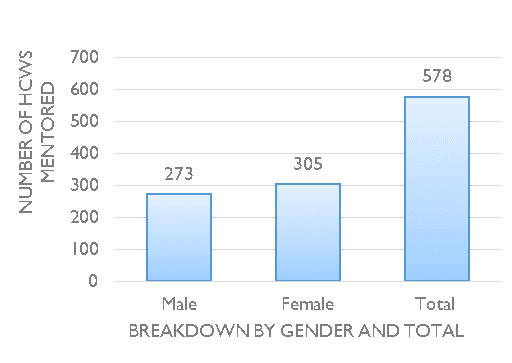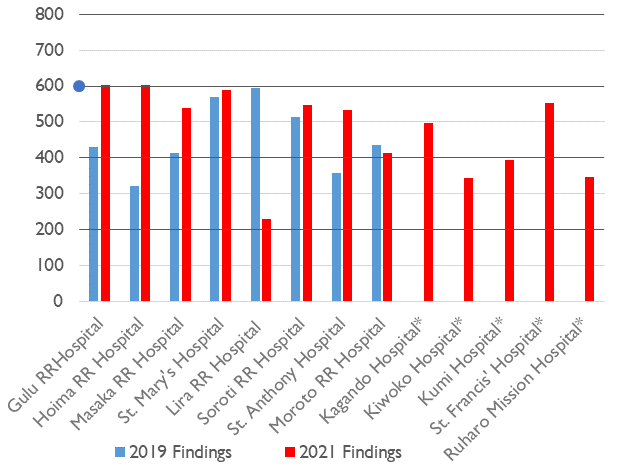MTaPS Sets Up Centers of Excellence in Uganda
Mr. Hassan Kasujja, Senior Technical Officer, USAID MTaPS Uganda
Dr. Marion Murungi, Senior Technical Adviser, USAID MTaPS Uganda
Originally published in the Uganda AMR newsletter
The USAID MTaPS Program in Uganda provides direct technical assistance to 14 health facilities, including six public regional referral hospitals and eight private, not-for-profit hospitals. The goal of this support is to build capacity to implement antimicrobial stewardship (AMS) and infection prevention and control (IPC) interventions sustainably. Activities are implemented as part of the broader effort to support the implementation of the Uganda Antimicrobial Resistance National Action Plan and improve the country’s capacity to respond to global health security threats. The results of these efforts are indicated in the improved Joint External Evaluation (JEE) scores. These beneficiary hospitals are supported to become Centers of Excellence for AMS and IPC with effective and efficient AMS and IPC programs that can extend support and benefits to lower-level health facilities in the regions.
Reducing Antibiotic Misuse: A Gradual Implementation Approach
The aim of the MTaPS-supported hospital AMS program is to improve overall antibiotic use culture and practice in the hospitals. However, in light of the complexity and challenges of implementing AMS programs, MTaPS is employing a gradual implementation approach that focuses on the most common causes of antibiotic misuse in Uganda hospitals. For the supported hospitals, the focus of the AMS intervention is to reduce antibiotic use in upper respiratory tract infections (URTIs), urinary tract infections (UTIs), and surgical antibiotic prophylaxis (SAP). The selection of these three conditions was informed by findings during the baseline assessment conducted by MTaPS, which indicated prescription of more than two antibiotics in URTI management and three antibiotics in UTI management and the in overuse of antibiotics during SAP partly was due absence of SAP programs in the hospitals. The implementation approach includes a mentorship program and continuous quality improvement (CQI) plan progress monitoring. Through the mentorship program, gaps for improvement are identified, and specific actions for improvement are recommended. By April 2021, MTaPS had conducted 43 mentorship visits, reaching out to 578 health care workers (HCWs) at 14 supported health facilities (figure 1).

Figure 1: Number of HCWs mentored at the supported facilities
Reducing Health Care-Associated Infections
In addition to the AMS improvement CQI plans, MTaPS is supporting IPC capacity improvement at the health facilities, with a goal to contribute to health care-associated infection (HCAI) reduction and improve control of antimicrobial resistance (AMR). MTaPS has continuously applied the World Health Organization (WHO) Infection Prevention and Control Assessment Framework (IPCAF) and the Hand Hygiene Self-Assessment Framework, which are the JEE benchmark recommended tools for improving IPC capacity in health facilities. The continuous application of these tools for assessment; identifying gaps; and using CQI plans and supporting their implementation through capacity building (e.g., mentorship; training; information, education, and communication materials; obtaining political support) has progressively let to health facility improvement (figure 2).

Figure 2: Changes in IPCAF scores between 2019 and 2021 at MTaPS-supported health care facilities
MTaPS is now supporting hand hygiene (HH)-focused CQI plans, with a goal of reducing HCAIs. HH is the most effective way of reducing HCAIs and is the WHO-recommended entry point for hospital IPC programs. Through these CQI plans, we plan to improve HH compliance from the baseline score of 16% to a target of 50% compliance in the short term. To inform the HH-focused CQI plans, MTaPS conducted surveys on health worker knowledge, attitudes, and practices for HH assessments and ward infrastructure. The findings are being used to inform specific interventions that will improve the availability of soap, water, and alcohol-based hand rub and improve knowledge about HH.
Technical Assistance for Quality Improvement and Sustainability
The application of a gradual implementation approach has allowed health facilities to build their hospital IPC and AMS programs, which is a key ingredient for sustainability and ownership. Through the provision of technical assistance, MTaPS has enabled health facilities to identify the challenge of AMR and provided tools to help fill the gaps in knowledge and skills. Moving forward, MTaPS will continue providing technical assistance for quality improvement while linking the health facilities to key national and sub-national structures for the provision of supplies.
*Facilities without 2019 results to compare with the 2021 results to show progress in results achieved.